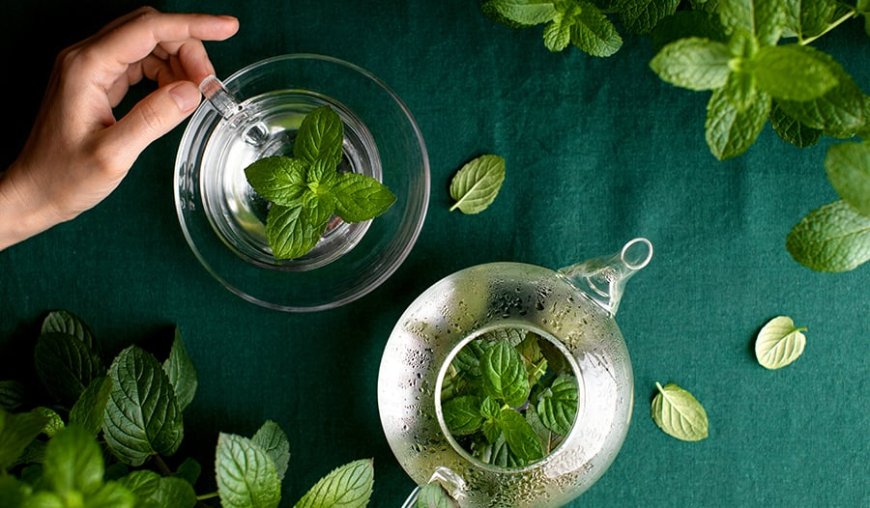Introduction:
In the realm of herbal teas, few beverages can rival the refreshing allure and healthful properties of spearmint tea. Derived from the leaves of the Mentha spicata plant, this aromatic infusion has been cherished for centuries for its myriad benefits, ranging from soothing digestion to enhancing mental clarity. Join us on a journey through the rich history, therapeutic virtues, and culinary delights of spearmint tea.
Historical Roots:
The story of spearmint tea traces back to ancient civilizations, where it was revered for its medicinal properties and culinary versatility. Historical records reveal its presence in ancient Egypt, where it was used for its digestive benefits and refreshing flavor. Across the Mediterranean, Greeks and Romans cultivated spearmint for its aromatic leaves, often incorporating it into culinary dishes and medicinal potions. Over the centuries, its popularity spread across continents, finding its way into traditional medicine practices and culinary traditions worldwide.
Nutritional Profile and Health Benefits:
Spearmint tea boasts a wealth of nutrients and bioactive compounds that contribute to its therapeutic potential. Rich in antioxidants, such as rosmarinic acid and flavonoids, it offers potent anti-inflammatory and antimicrobial properties, aiding in the body's defense against oxidative stress and pathogens. Moreover, spearmint tea contains essential vitamins and minerals, including vitamin C, vitamin A, and manganese, which support immune function and promote overall well-being.
One of the most renowned benefits of spearmint tea lies in its ability to promote digestive health. The menthol content in spearmint leaves acts as a natural carminative, helping to alleviate symptoms of indigestion, bloating, and gas. Regular consumption of spearmint tea may also soothe gastrointestinal discomfort and promote regularity.
Beyond digestive health, spearmint tea is celebrated for its potential to support hormonal balance, particularly in women. Studies suggest that spearmint tea may help reduce excess androgen levels in individuals with polycystic ovary syndrome (PCOS), a common endocrine disorder characterized by hormonal imbalances. By inhibiting androgen production, spearmint tea may alleviate symptoms such as hirsutism and menstrual irregularities, offering a natural adjunct to conventional treatments.
Furthermore, spearmint tea exhibits promising effects on cognitive function and mood. The refreshing aroma of spearmint stimulates the senses and promotes mental alertness, making it an ideal beverage for enhancing focus and concentration. Some research suggests that the compounds found in spearmint may exert neuroprotective effects, potentially reducing the risk of cognitive decline and age-related memory impairment.
Culinary Applications:
In addition to its medicinal virtues, spearmint tea lends itself to a variety of culinary applications, adding depth and freshness to both sweet and savory dishes. In the realm of beverages, spearmint tea serves as a delightful base for refreshing summer cocktails and mocktails, infusing them with a cooling, herbal essence. Its subtle sweetness pairs harmoniously with fruits like lemon, lime, and berries, creating vibrant concoctions that tantalize the taste buds.
Moreover, spearmint tea can elevate the flavors of savory dishes, imparting a bright, aromatic note to salads, marinades, and sauces. Its versatility extends to the realm of desserts, where it can be incorporated into ice creams, sorbets, and baked goods to impart a subtle minty flavor.
Tips for Brewing the Perfect Cup:
To unlock the full flavor and therapeutic benefits of spearmint tea, proper brewing techniques are essential. Start by bringing fresh, filtered water to a gentle boil, then pour it over a handful of fresh or dried spearmint leaves in a heatproof vessel. Allow the leaves to steep for 5-7 minutes, depending on your desired strength, before straining the infusion into a cup. For added sweetness, you may stir in a touch of honey or agave nectar, though spearmint tea is delightful on its own.
For a refreshing twist, try incorporating additional herbs or flavorings into your spearmint tea blend. Fresh lemon slices, ginger root, or a sprig of lavender can impart unique nuances to your brew, enhancing its complexity and aroma.
Conclusion:
In conclusion, spearmint tea stands as a testament to the enduring allure of herbal remedies and culinary delights. From its ancient origins to its modern-day resurgence, this fragrant infusion continues to captivate enthusiasts with its refreshing flavor and multifaceted benefits. Whether enjoyed for its digestive support, hormonal balance, or culinary versatility, spearmint tea remains a beloved staple in the world of herbal beverages. Embrace its charm, savor its essence, and experience the rejuvenating power of spearmint tea.
